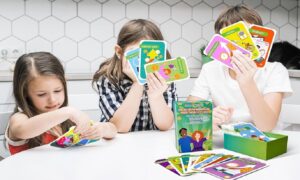
Introducing children to a second language at a young age can significantly shape their cognitive development and language skills. For many parents in Singapore, combining preschool Chinese tuition with K1 and K2 enrichment programs has become an effective way to ensure their children build strong language foundations early on. Here are several ways this integration supports holistic development for preschoolers.
Establishing a Solid Language Base
Starting preschool Chinese tuition at a young age allows children to absorb the language in a more natural and immersive environment. Thanks to their brains’ flexibility, preschoolers are more likely to learn new languages quickly. When this tuition is combined with a Chinese enrichment class for K1, it deepens the language foundation by reinforcing basic vocabulary, pronunciation, and sentence structure. Such early integration ensures children become more confident in using Chinese in everyday conversations, which supports their transition to primary school education.
Enhancing Cognitive Skills Through Language Learning
Language acquisition during preschool years improves communication skills and enhances cognitive development. Combining Chinese enrichment classes for K1 and K2 with regular Chinese tuition helps to stimulate memory, problem-solving, and critical thinking abilities. The structured environment of these programs promotes better focus and attention, which are essential for early learning. Additionally, learning Chinese characters improves visual recognition and motor skills, further aiding in children’s cognitive growth.
Preparing for Primary School Curriculum
Many parents need help with how their children will cope with the primary school curriculum, particularly regarding Chinese as a subject. By integrating Chinese enrichment classes for K1 with ongoing tuition, children gain a strong understanding of the language’s basics before entering primary school. The combination ensures they become familiar with Chinese reading, writing, and comprehension skills at an age-appropriate level, which helps reduce the anxiety and learning curve when they start formal schooling.
Strengthening Social and Emotional Development
Participating in a Chinese enrichment class for preschool supports language development and enhances social interactions and emotional growth. Through group activities, role-playing, and interactive learning, children learn to express themselves in Chinese while building friendships and working as a team. This collaborative environment fosters communication skills and boosts confidence, which is vital to their overall social and emotional well-being.
Making Learning Fun and Engaging
One key benefit of combining preschool Chinese tuition with enrichment programs is the ability to make learning enjoyable. These programs often incorporate fun activities such as storytelling, songs, games, and arts and crafts to teach the language creatively and engagingly. This playful approach holds the child’s interest. It makes learning Chinese less daunting and exciting, ensuring that children stay motivated to continue learning.
Providing Individualised Attention for Language Mastery
While group learning has advantages, integrating Chinese enrichment classes for K1 and K2 with tuition provides children with more focused learning opportunities. Tuition offers smaller classes or one-on-one sessions, allowing for more tailored guidance. This personalised approach ensures each child’s specific learning needs are met, leading to quicker language mastery and a more in-depth understanding of Chinese.
Developing Strong Listening and Speaking Skills
One of the main goals of early childhood education is to build strong communication skills. Combining Chinese enrichment classes for preschool with tuition gives children ample opportunities to practise listening and speaking. These programs use repetition, listening exercises, and conversational practice to ensure children develop a natural fluency in speaking Chinese. This early focus on oral communication prepares children to express their thoughts confidently and clearly in Chinese.
Promoting Cultural Awareness
Another significant benefit of integrating preschool Chinese tuition with enrichment programs is the cultural exposure it provides. In addition to learning the language, children are introduced to Chinese festivals, traditions, and stories, fostering a deeper appreciation of the culture. This cultural awareness enriches their learning experience and enhances their connection to their heritage, helping to instil pride and curiosity about the language.
Conclusion
Combining preschool Chinese tuition with Chinese enrichment classes for K1 and K2 offers numerous advantages for young learners. These programs provide a holistic approach to early childhood education, from building a solid language foundation to enhancing cognitive, social, and emotional development. By making learning enjoyable and culturally enriching, they ensure that children are well-prepared for the challenges of primary school and beyond.
For more information, contact Hua Cheng Education Centre today.



